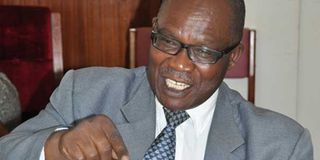We have safe houses but not for torture - minister

Mr Muruli Mukasa before Parliament yesterday. Photo by Geoffrey Sseruyange
What you need to know:
Mr Muruli Mukasa insists that safe houses are there to provide privacy for people willing to give security information .
Contrary to reports by human rights defenders that Uganda continues to run detention facilities where individuals are held incommunicado and tortured, the Minister for Security has said the houses are a sanctuary for informants.
Mr Muruli Mukasa, who was appearing before the Committee on Legal and Parliament Affairs handling the Prohibition and Prevention of Torture Bill 2010, yesterday said torture will now be history, especially after the disbandment of the notorious police outfit- the Rapid Response Unit.
He said safe houses are secure, in a good environment and well furnished for anyone who wants to give any kind of security information. He, however, declined to state the areas in which they are located.
“Those houses are there but they are not detention centres or torture houses,” Mr Mukasa said.
He added: “For example if a leader of opposition wants to meet us and offer some information, do you expect me to meet him at a hotel where everyone will see us? If another country has an informant to us, do we check such a person in a hotel? We need such secluded places for hiding these people.”
The Human Rights House Network in its April 2009 report accused Ugandan officials of complicity in torture, saying a branch that handles anti-terrorism work is responsible for extended illegal detentions, torture, and other maltreatment at a facility based in a wealthy suburb in Kampala.
In 2010, the Uganda Human Rights Commission was reportedly blocked three times from accessing the safe houses operated by the Joint Anti-Terrorism Task Force in Kololo. Security agencies and their commanders then denied the country was operating safe houses.
Even if his agencies are loathed for high torture records in the country, Mr Mukasa said his office and agencies support the Bill, which is advocating for special stringent penalties to actors of torture acts.
Protection
“We do not want to use torture as a means of obtaining information because we have accepted and signed the International treaties on human rights. We, however, want the Bill to be made simple to also protect the handlers of security.
Among the amendments, Mr Mukasa proposed was the need to have the law re-drafted to avoid being skewed towards potential suspects, hence presupposing that the State is very bad and the people in it are good.
The Minister also asked the committee to have recorded an amendment which provides a different penalty and case to a head of security whose officers are involved in torture.
“When I send my officers to handle a suspect and they torture that suspect, they should be held individually responsible and maybe as a head of the institution one can take political responsibility,” Mr Mukasa said.



